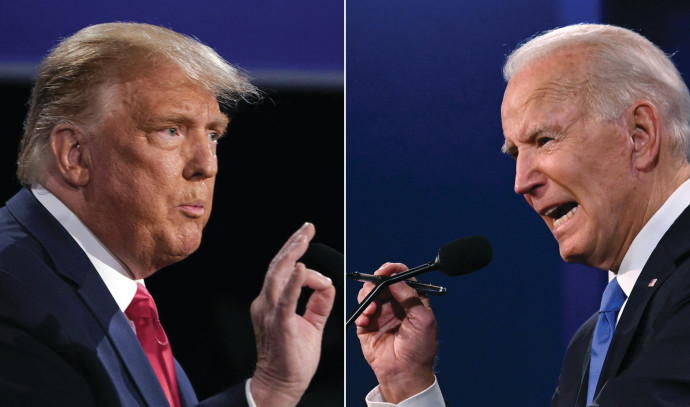The US presidential debate between former US President Donald Trump and current president Joe Biden has led to many takeaways. For those focused on the Middle East and Israel, the debate illustrated how the region is not a major focus.
Despite a specific question about Palestinian statehood and some focus on Iran and the Gaza war, both candidates appeared to eschew a deep dive into the region.
It’s clear that Biden is interested in underlining his attempt create a hostage deal and ceasefire in Gaza. Trump compared his opponent to a Palestinian and drilled down on the fact that Iran is emboldened, and accused Biden of failing in the Afghanistan withdrawal.
In essence, Trump’s point was that if Biden had handled Afghanistan better, then Russia would not have been emboldened to invade Ukraine and Hamas would not have been emboldened.
Biden has often run on his historic record regarding foreign policy and decades of experience on the global stage. However the debate was a disappointment for some Democrats who saw Biden’s performance as stumbling.
The big question in the wake of the debate is whether the Middle East is actually in focus now. Biden has been dragged into focusing on the Middle East by the Gaza war, but it was not something he wanted to focus on.
The problem for the US is that its ally, Qatar, hosts Hamas. This was supposed to make Hamas more moderate and prevent massacres like October 7, instead Hamas has become more powerful under backing by Doha, Tehran, Ankara and Moscow.
Two US allies back Hamas; Qatar and Turkey. It was the Obama administration that asked Doha to host Hamas. Israel also worked with Doha to enable funding for Hamas. This policy appears, in retrospect, to have been disastrous. However, none of the candidates appear to care much about this.
Trump’s main focus is in discussing Iran, and beyond that his main manifesto is that exhibiting a kind of America first strength will deter adversaries.
Pro-Hamas activists are a loud minority
While the pro-Hamas activists in the US, primarily extremists in places like New York and California, have made it seem the Gaza war it’s important, the debate showed that a lot of Americans probably don’t care about the war.
College activists and extremists want to drag Americans into focusing on the war but most Americans care about the economy and issues closer to home. They don’t want to be colonized by the obsessive anti-Israel focus that some privilege college students have.
The focus on the conflict is primarily on social media and riots in places like New York City where activists targeted an exhibit about the Nova festival victims recently.
There may be a second US presidential debate before the election. It may focus more on foreign policy. However, the first debate taught us that even when the hosts ask the candidates about issue, the candidates often stray from the discussion.
Trump, for instance, was asked pointedly about Palestinian statehood, but his only comment was “I will have to see.” This sums up the debate and the Middle East in general. There is a wait and see.
This will lead many regional states to takeaway a feeling the US is not focused. That likely makes chances of a hostage deal and ceasefire less likely.
Those who think the US will pressure everyone, Israel or Hamas, into a deal are now likely taking a wait and see approach. Iran, Russia and Turkey will be emboldened and seek to exploit the post-debate period.







